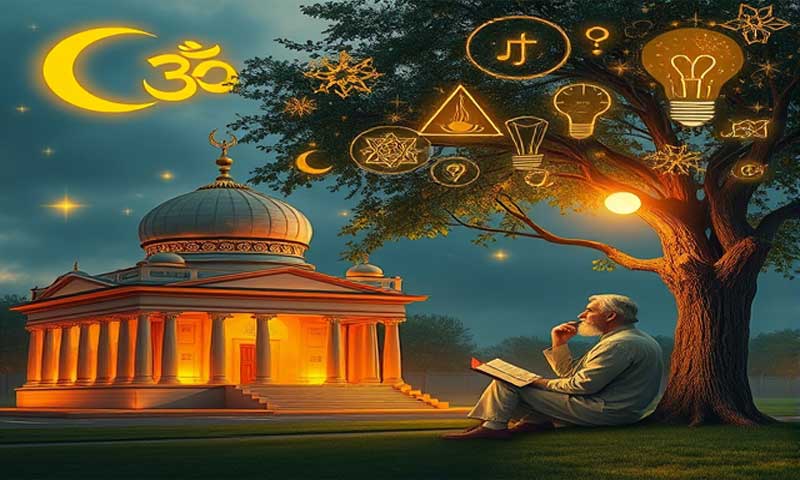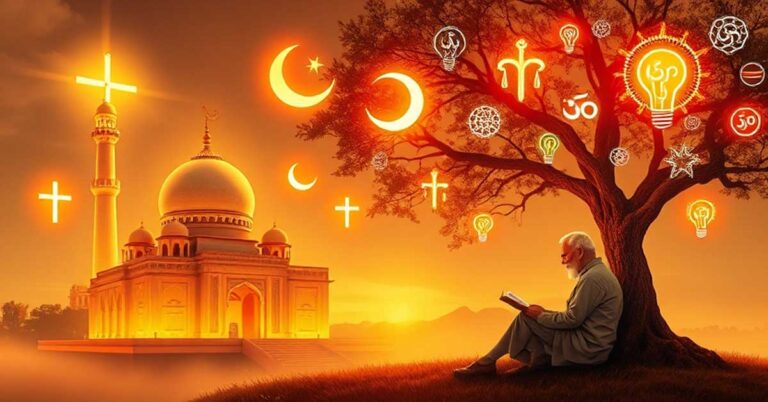Religion and Philosophy: Religion and philosophy are two very important and profound concepts that shape people’s lives, thoughts, and outlook on the world. However, despite the fundamental differences between these two concepts, they are related to each other and can complement each other. In this article, we will analyze the meaning of religion and philosophy, the differences and relationships between them, and try to answer all the questions that you may have in your mind.
What is the meaning of religion?
Religion is generally defined as a belief system that guides the spiritual and moral life of a person. It is a way of life that emphasizes belief in God or a supernatural power and expresses respect and devotion to that power. The main goals of religion are spiritual advancement, morality, and peace in society.
Religion shapes human life through various rituals, beliefs, and customs. Based on religious beliefs, people live their lives, establish relationships with others, and maintain proper behavior in society.
Some examples of religion:
- Islam: A monotheistic religion, where belief in Allah and adherence to His laws are practiced.
- Hinduism: A diverse religion, where belief in many gods and spiritual systems is practiced.
- Christianity: A religion based on the teachings of Jesus Christ and belief in God.
- Buddhism: A religion practiced for the purpose of spiritual development, following the teachings of the Buddha.
What is the meaning of philosophy?
Philosophy is a system of knowledge acquisition and analysis that produces deep thoughts and theories about the world, human existence, morality, society, and the nature of the universe. Philosophy primarily attempts to find the meaning of life and the world through human thought, logic, and judgment.
It is not based on any religious or spiritual beliefs, but rather is based on logic, analysis, and thought. Philosophy is a form of self-exploration in which various theories, doctrines, and arguments are explored to gain a deeper understanding of human life and the world.
Some branches of philosophy:
- Logic: The rules for the proper use of thought and reason.
- Ethics: The question of morality and the judgment of human right and wrong.
- Metaphysics: The deep investigation of the nature of reality and existence.
- Epistemology: The nature of knowledge and the methods of human knowledge acquisition.
Difference between religion and philosophy
There are some fundamental differences between religion and philosophy, which distinguish them according to their characteristics.

- Basis of Belief:
- Religion: Religion is mainly based on belief in God or supernatural powers. It guides human life through spiritual consciousness and faith.
- Philosophy: Philosophy tries to understand the nature of the world and the main purpose of life through logic, thought and analysis. It is more dependent on evidence and reason than faith.
- Rituals:
- Religion: Religion has specific rituals and customs, such as prayer, fasting, worship, etc.
- Philosophy: Philosophy does not ask to follow any rituals, but rather it is an attempt to understand life through thought and theory.
- Guidance and Method:
- Religion: Religion guides the morality, conduct and spirituality of man. It encourages people to take advice from scriptures, saints and religious leaders to guide their lives.
- Philosophy: Philosophy motivates people to think and understand the world through reason. It usually seeks answers to the fundamental questions of human life.
Relationship between religion and philosophy
Religion and philosophy, although distinct, can complement each other. Religious leaders often try to explain religious matters through philosophical thought and logic.
- Philosophy within religion: Many religious philosophers, such as Imam Ghazali (Islam) and Shankaracharya (Hinduism), have used philosophical thought to provide rational explanations for religious beliefs and rituals.
- Philosophy and Spirituality: Some philosophical doctrines, such as the thought of Plato, Hegel, and Bettelheim, delve deeply into spiritual or religious questions.
Similarities between religion and philosophy
Both religion and philosophy seek a deeper purpose in human life. Religion speaks of the spiritual and moral development of man, while philosophy seeks to understand the nature of the world and the meaning of existence. Religious inquiry can often be based on philosophical questions, while philosophy can also focus on spiritual questions.
Decision
Religion and philosophy are two very deep and broad fields that have had a huge impact on the thoughts, cultures, and beliefs of mankind. Although they have differences, they can complement and supplement each other. Religion guides people’s lives from a spiritual and moral perspective, while philosophy tries to explore the deeper questions of the world and life through reason and thought.
Both religion and philosophy play an important role in human life’s search for goals and purposes, which makes our lives more meaningful and fulfilling.
(FAQ) related to religion and philosophy
What is religion?
Religion is a belief system that establishes belief in God or a supernatural force and determines human behavior, morality, and lifestyle based on that belief. Religion contains principles related to spiritual development, social welfare, and orderly living.
What is philosophy?
Philosophy is the system of thought or rational method by which people try to understand the nature of the world, life, existence, morality, and reality. It is not based on any religious belief, but rather reaches conclusions through reason and analysis.
What is the difference between religion and philosophy?
Both religion and philosophy seek answers to life’s big questions, but their methods are different. Religion follows spiritual beliefs and rituals, which include belief in God or supernatural forces. On the other hand, philosophy seeks answers to fundamental questions about nature and life through logic, thought, and analysis. Religion has rituals and rules, but philosophy usually does not have any specific rules or methods.
Is religion only a matter of spirituality?
No, religion is important not only spiritually but also socially and morally. Religion teaches the principles of character building, love, compassion, and helping others. Therefore, religion is important not only for spiritual development, but also for peace, compassion, and the well-being of society around the world.
How can philosophy influence our lives?
Philosophy influences the way we think and make decisions. It teaches us to think deeply about various questions in life, such as morality, purpose, and existence. Philosophy helps us solve problems through logic, gain confidence, and follow the right path. Philosophical thinking can also affect our mentality and social relationships.
Are religion and philosophy opposed to each other?
No, religion and philosophy are not opposed to each other, but rather they can complement each other. Many times religious philosophers have explained religious beliefs through philosophy, and philosophy has also found answers to spiritual questions. Philosophy explores various aspects of religious questions through thought and logic, while religion shapes human life from a spiritual perspective.
How can we think about religion and philosophy together?
When we think about religion and philosophy together, we understand that religion helps shape our spiritual path and moral life, while philosophy tries to understand the nature of life, the world, and existence through our reason. They explore the depths of all aspects of human life, complementing each other.
How can I gain knowledge related to religion and philosophy?
To gain knowledge about religion and philosophy, you can read various religious books, philosophical books, and theoretical analytical works. By reading the works of the greatest philosophers on philosophy, such as Plato, Aristotle, Kant, and other ancient and modern philosophers, you can gain a deep knowledge of logic and thought. In addition, listening to religious discussions and lectures or studying religious books can also be helpful.
How can religion and philosophy work together to improve human life?
Religion and philosophy can together improve human life. Religion emphasizes morality, spirituality, and social welfare, while philosophy seeks to understand the deeper questions of life and the nature of the world through reason. Together, they help improve people’s thinking, behavior, and outlook on life.
Are religion and philosophy only theoretical matters, or are they practically applicable to our lives?
Religion and philosophy are not just theoretical subjects, but they have many benefits in real life. Religion points out a path for moral behavior and spiritual development of people, which in reality provides peace, compassion and help in society. Philosophy improves our thinking and decision-making ability, which helps us solve problems in our daily lives. Therefore, these two subjects are applicable in real life and are important in improving the quality of life.

Your comment will appear immediately after submission.